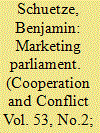|
|
|
Sort Order |
|
|
|
Items / Page
|
|
|
|
|
|
|
| Srl | Item |
| 1 |
ID:
191381


|
|
|
|
|
| Summary/Abstract |
For resource-poor countries in the MENA, the expansion of renewables represents a unique chance to overcome established geopolitical dependencies, develop employment opportunities, and pursue a long-term strategy of domestic energy security. While, in 2018, Jordan was declared one of the top three emerging markets globally for clean energy investment, in 2019, efforts at transition had come to a temporary halt. Jordanian attempts at energy transition were motivated by concerns for energy security, rather than sustainability. Whereas energy security and transition to renewables initially seemed to coincide, technical restraints and a renewed turn to fossil fuels have undermined efforts at transition, seemingly boosting energy security on the short-term, but compromising it on the long-run. We argue that the case of Jordan illustrates how domestic and regional political and economic drivers may undermine efforts at energy transition, deepen established dependencies, and transform renewables’ distributed nature into concentrated forms of power. By zooming in on key entry points for energy flows into Jordan, we explore what dynamics are (re-)energised, and which ones undermined. Finally, we suggest decentralised renewables, communal ownership models, and the empowerment of marginalised municipal authorities as means to strengthen inclusive and participatory practices and overcome fossil fuel dependencies.
|
|
|
|
|
|
|
|
|
|
|
|
|
|
|
|
| 2 |
ID:
159967


|
|
|
|
|
| Summary/Abstract |
The Jordanian parliament is widely recognised as a patronage provider and means for authoritarian upgrading. Despite, or precisely because of this, it has over the past years become a linchpin of US and European attempts at parliamentary strengthening. The parliament’s highly marginalised position notwithstanding, this article suggests that such efforts provide us with an insightful opportunity to better understand the reconfiguration of authoritarian power via external intervention in the name of democracy. Discussing the contradictory effects of parliamentary strengthening programmes in Jordan, the article tries to shift the discussion of democracy promotion away from a concern with policy, conceptual debates and intentions to one with democracy promotion’s constitutive effects. As such, the article investigates the framing of Jordanian politics within a market rationale as central mechanism for the de-politicisation of uneven power relations. Further, it explores the ways in which democracy promotion serves to seemingly reconfirm interveners’ desired self-understandings via the maintenance of assumptions of cultural ‘difference’. Ultimately, it is suggested that decentring the study of democracy promotion by paying more attention to its constitutive effects provides us with a better understanding of why and how increasing democracy promotion portfolios have, in Jordan, had the effect of strengthening authoritarianism.
|
|
|
|
|
|
|
|
|
|
|
|
|
|
|
|
| 3 |
ID:
155814


|
|
|
|
|
| Summary/Abstract |
The King Abdullah II Special Operations Training Center (KASOTC) was financed and established by the US Department of Defense, is operated by a US private business, and is owned by the Jordanian army. It not only offers a base for the training of international Special Forces and Jordanian border guards, but also for military adventure holidays, corporate leadership programs, and stunt training for actors. This article provides an analysis of the processes and technologies involved in US–Jordanian military collaboration by investigating some of the ways in which war is simulated, marketed, and played at KASOTC. Particular focus is paid to the stark biopolitical judgments about the different worth of human subjects and their role in intersecting processes of militarization and commercialization. The article argues that US–Jordanian military collaboration at KASOTC is marked by the simultaneous blurring and reinforcement of boundaries, as commercial security is moralized and imagined moral hierarchies marketized. While war at KASOTC is an interactive and consumable event for some, it engenders deadly realities for others. The article is an empirically-grounded contribution to critical security studies based on interviews and observations made during a visit to KASOTC in early 2013.
|
|
|
|
|
|
|
|
|
|
|
|
|
|
|
|
|
|
|
|
|